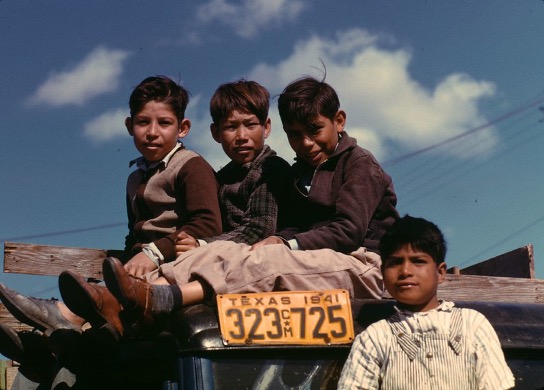By Natalia Venegas / GICJ
ON Thursday, 17th of January 2022, U.S. Customs and Border Protection apprehended 336 children, more than double the number recorded on December 30, 2021, when 150 minors were detained. Of these children, almost 76% of the federal cases are about fifteen years or older, but there are cases of infants and toddlers [1]. Unaccompanied children are defined by United States law as "migrants under the age of 18 without legal status in the United States and without a parent or guardian who can care for them" [2].
Children are leaving Central America on their own due to poverty, violence, and climate conditions. Nowadays, Guatemala, Honduras, and El Salvador represent two-thirds of the unaccompanied children apprehended. The rest are from Mexico, where the war against the cartels has led to more insecurity and homicides. Other reasons for children leaving their families are domestic abuse, criminal gangs, and local corruption. Also, parents send their children across the border alone to take advantage of asylum protections for unaccompanied minors.
 The immigration status is one of the biggest problems. Unaccompanied children, for example, are selected for asylum eligibility and are entitled to file a claim for it. It does not matter that they have only been in the United States for a year. However, in 2018 U.S. Citizenship and Immigration Services (USCIS) granted just 28 per cent of child asylum applications. In recent years, the denial rate for asylum has decreased from 72 to 63. But, the USCIS offers other forms of legal relief to some unaccompanied minors, including special visas for survivors of human trafficking and parental abuse [2].
The immigration status is one of the biggest problems. Unaccompanied children, for example, are selected for asylum eligibility and are entitled to file a claim for it. It does not matter that they have only been in the United States for a year. However, in 2018 U.S. Citizenship and Immigration Services (USCIS) granted just 28 per cent of child asylum applications. In recent years, the denial rate for asylum has decreased from 72 to 63. But, the USCIS offers other forms of legal relief to some unaccompanied minors, including special visas for survivors of human trafficking and parental abuse [2].
There are a lot of agencies and bureaucracy involved in the case of unaccompanied child migrants. For instance, according to the Homeland Security Act of 2002, both the Departments of Homeland Security (DHS) and Health and Human Services (HHS) have to take responsibility for unaccompanied children. In 1997, a lawsuit against federal immigration authorities resulted in the "Flores Settlement". According to the Flores Settlement, the United States government must provide unaccompanied minors with basic human needs such as food and water, emergency medical care, bathroom facilities, and a ventilated, temperature-controlled environment.
Regarding the process, the first agency involved is the Department of Homeland Security (DHS). The agency is responsible for children's apprehension, processing, and return to their countries of origin. DHS's Customs and Border Protection (CBP) initially detain children who cross the border and are identified as unaccompanied children. Their status is determined through interviews, documents, and medical tests. The CBP then separates the minors from adults, not based on general criteria but a case-by-case approach. This separation is usually fundamental in classifying the adults as unrelated, dangerous, or criminally prosecutable. The separation leads to children being classified as unaccompanied.
In the meantime, Health and Human Services (HHS) are responsible for placing unaccompanied children in a "least restrictive setting" while they are in federal custody. The "least restrictive setting" often means that HHS will send children to group homes, foster care, or other kind of facilities meant to provide long-term childcare. Meanwhile, there is a decision to be made for the children. And one of three options can happen. First, the child loses their case and is deported to his/her country of origin. Second, the child becomes a legal adult and is either released or detained in the adult facilities waiting for a court proceeding. Or the child wins asylum or immigration relief and can start in the United States legally.
The Biden administration took a different approach. His Justice Department formally terminated the zero-tolerance policy. Following that, he established a task force to reunite separated children with their parents. Also, some officials have provided temporary legal status for some children coming from the Northern Triangle before their journey to the border, reinstating the Central American Minors program (CAM). Nevertheless, on December 6, 2021, the U.S. government resumed the MPP program, also known as "stay in Mexico", due to an order from the Supreme Court. Because, according to the law of the United States, minors can't be held with their families while they await the trial. The measures taken by the administration led to the separation of more than 4,300 children from their legal guardians between July 2017 and June 2018, reclassifying children as unaccompanied minors. The resuming of the program complicates the situation for children that are currently separated from their parents and has severe repercussions on human rights.
Geneva International Centre for Justice (GICJ) calls upon the United States to grant children the opportunities and basic needs they require, respecting the Convention of the Child's Rights. GICJ expresses that the MPP program is a severe violation of human rights, especially the American Declaration of Human Rights, which comprehends the right to asylum. GICJ also considers that children should be granted asylum if required, attending to their fundamental human rights.
Justice, Human Rights, Child migrants, Children's Rights, Right to asylum, Migrants, Unaccompanied alien children, Rights for children, UN human rights, Human Rights Council, Due process, geneva4justice, GICJ, Geneva International Center for Justice
[1] https://www.latimes.com/espanol/eeuu/articulo/2022-01-21/aumentan-cifras-de-ninos-migrantes-que-llegan-solos-a-la-frontera-sur-de-eeuu
[2] https://www.cfr.org/backgrounder/us-detention-child-migrants
Image sources: Flickr












